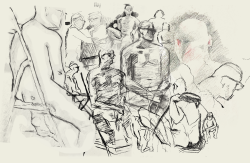“I don’t like school papers,” Officer Malcolm Rhinehart told me, minutes after I sat down in his patrol car. Apparently, a past interview had gone awry.
Rhinehart, an unassuming black man with thin frame glasses, a graying buzz cut and short mustache, would spend the next four hours on his evening patrol shift as I rode shotgun, trying to learn something—anything—about what it is to be a police officer in our neighborhood.
As Rhinehart set about police work, from ticketing errant taxi drivers to lecturing a pervert, I wouldn’t find out much about him. But watching him work through situations bizarre and depressing, filing pages of paperwork as he went, it was possible to get the sense that D.C.’s police aren’t just those who arrest Georgetown students for being drunk and disorderly; they’re the people who take care of the District when it sleeps.


The anti-World Bank and IMF protestors didn’t make a great impression on the police. It’s not necessarily the trouble of dealing with the demonstration, at its most violent in Georgetown on Friday night when windows—and one woman’s face—were struck with thrown bricks. The problem was the workload: the entire police force was working mandatory twelve-hour shifts from Friday through Monday, six to six. The police were exhausted by their Monday night shift-change, when I arrived at the 2nd District Headquarters, the police station responsible for Georgetown and the surrounding environs. About twenty tired officers lugged bags of gear from their detail at the demonstrations through the squealing metal detector while I waited in the seventies-style institutional lobby, watching officers on desk duty joke around and write out parking permits for the occasional visitor.
Just before 7:30, Rhinehart came halfway through the door, his collar open, a tie clipped to the buttonhole. “You the ride-along?”
Sliding into the seat of his scout car, a Chevy Impala with a surprisingly normal interior, only the controls for siren and flashers, the radio and unobtrusive handles for twin spotlights reminded me I was in a police car. Rhinehart, who normally works the evening shift (3 p.m. to 11 p.m.), had begun his all-night duty with roll call—a briefing from the duty officer—and then set out to patrol his Police Service Area (normally 203, up by Sibley Hospital, but tonight, 205, just northwest of Georgetown) until dispatch radioed him an assignment, a “run.” Rhinehart, unlike other officers on the radio, scrupulously referred to the dispatcher as “ma’am.”
Not much of a talker, Rhinehart—why’d you become a policeman? “Someone had to do it.” What was the Academy like? “It’s just what it is.” But I learn, as we head down to the intersection of K and 17th to check out a car accident, that the six-year veteran has an unofficial partner—“I make sure he gets home at night, he makes sure I get home at night”—and a wife who texts him sweet missives throughout the night and tries to bring him dinner, and that when he gets off duty in the morning he makes his daughter breakfast and takes her to school.
At the scene of the accident, a fender bender involving a green Ford Taurus and a black Volkswagen Bug, Rhinehart asks me to stay in the car. While he examines the scene and helps the drivers fill out paperwork—one writing, incongruously, on the box of a “Gone with the Wind” 2000-piece puzzle—I bide my time, enjoying the effects of the flashers on the surrounding cars and buildings (just like COPS!) and spotting about twenty mints secreted inside his plastic box clip-board, where he records each run. Before I arrived, he’d been to a tripped burglar alarm and an assault.
The next run was to collect the report of a simple assault at Hotel Palomar, a swanky stay-over on P Street near Dupont Circle. Presumably I’d done something right, since he let me follow him out of the car. Outside the hotel, clusters of well-dressed people lingered chatting, some in foreign languages, as Rhinehart met with a security guard sporting a small fedora and towering over the police officer, who stands about 5’10”. We followed him inside the building, through a lobby studied with abstract artwork and more swanky guests who smelled of cologne; ambient music filled the room. In a hallway near the kitchen we found a pretty girl, college-age, in an all black outfit—the uniform of a front-desk worker at the hotel. She had been assaulted outside, I gathered, but didn’t understand how until we took a service elevator to the security office and sat watching digitized security film of what happened a few hours before: a tall man in a red hat, dark vest and jeans walking down the sidewalk in front of the building came up to the girl, easily recognizable on-screen, and aggressively hugged her while trying to kiss her face. “I had to do the matrix; he was so close I could smell his breath,” she said, obviously shaken by the encounter. The security guard, like all the staff, sported an alter-ego cognomen under his real name tag, reflecting the hotel’s theme of “art in motion.” His was “Ice Cube.” Suddenly, he touched his earpiece. “He’s outside!”


We all stood and rushed to the elevator; even the stoic Rhinehart seemed excited to be in action. The girl, for obvious reasons, declined to join us, but Rhinehart explained to her as we left that “I can’t lock him up,” since he hadn’t technically assaulted or sexually harassed her, just invaded her personal space. He could, though, warn the hugger. The security guard led us down the street a few buildings until we found our man, hugging a restaurant worker in an apron in front of a diner. The security guard marveled at the man’s audacity. “Easy,” Rhinehart replied, “He doesn’t think he did anything wrong.” While Rhinehart approached the man, we waited a few yards away, listening.
“That was out of friendship!” the hugger shouted, promising to apologize and buy the girl flowers. Rhinehart took his ID and called it in to the station, and discovered that the man had some priors. The guard went to see if the girl would let the man apologize (she declined), leaving us alone with him as he ranted to the general area, “I know I’m a new face in the place but I got love and I’m going to show the love.” Rhinehart lectured the man about appropriate ways to show his love and warned him to stay away from the hotel’s employees in the future. The hugger shook the officer’s hand, and then, despite my efforts to avoid eye contact, mine. When we returned to the hotel office, the officer gave the guard his cell number and told the girl what happened. “You look like my niece,” he said, telling her to call him if the man gave her trouble again, and indicating, without quite saying it and with a meaningful look in my direction, that he would make sure that there wouldn’t be a third time. “Giving people love has to be consensual, and if they want it,” he concluded.
Walking back to the cruiser, I remarked that it was a pretty bizarre situation.
“That ain’t bizarre. There’s more bizarre,” Rhinehart replied, without elaboration.
On a given night, there are about forty or fifty officers patrolling a police district. Each is part of a force undergoing a transformation with a Chief, Cathy Lanier, who has been in charge for only nine months. The first woman to hold the job, and a white police chief in a majority black city, she faces serious morale problems and turnover in her force. This past spring, an independent accreditation commission recommended that the MPD not be accredited because of poor documentary preparation, though it was “duly impressed by some of the excellent work being done by agency personnel and observed their pride in the role they perform in protecting the citizens of the District.”
Rhinehart took obvious pride in his job, barely concealing his disapproval when officers didn’t respond to run calls on the radio or his surprise that a worker at a group home reported a missing person, as she had several times before, but had never been asked to provide her ID, apparently a standard procedure. Just outside of Dupont Circle, the “House of Seven Steps,” run by D.C. Youth Services, is home to young men committed there for criminal activity as juveniles or being neglected in foster care. In this case, an 18-year-old living in the home because of a simple assault had not returned from school at 5 p.m., as was required. By quarter of nine, the supervisor there was filing a missing person’s report. Both Rhinehart and the supervisor had clearly done this before, and handled the paperwork with a weary professionalism while the other residents watched a movie in the next room. What would the result be? “He’ll come back,” Rhinehart said, “Nine times out of ten.”
Rhinehart turned his patrol car toward the station. He needed to file more paperwork about the missing person with his captain and with other police branches. He also wanted to get away from the center of the city and out towards the PSAs where he was more accustomed to working. While he checked in, I examined a wall of pictures memorializing officers who died in the line of duty, including one officer whose citation strangely noted that, when he was shot by a burglar, he was killed “over a stack of sweatshirts made from the movie ‘Rocky.’” Rhinehart returned to tell me that we would be joined by a “midnight officer,” Vivian Clark, who normally worked the night shift, 11 p.m. to 6 a.m. Clark was an ebullient woman with a huge bun of hair held back tight by a hair band. Rhinehart had never met her.
Clark, who chatted as we drove, brought Rhinehart out of his shell enough to joke about a time he was called to a Bloomingdales on the Maryland side of Western Avenue, the boundary between the District and the state. Without jurisdiction, he jokes, “you send me there and I might go shopping!” They even got to talking about the madness of Georgetown on Halloween, wondering how students can bring themselves to get so drunk they can hardly stand up. Rhinehart says he’d like to drive through and watch the show, but doesn’t want to work the neighborhood that night.
Clark asks Rhinehart if they can “make sure my homeless people are okay tonight,” a regular ritual when she’s on duty—cop as social worker. As they drive through darkened neighborhoods, shining the scout car’s spotlights into parks and parking lots, they discuss the habits of D.C.’s homeless, a constituency they’re quite used to. When they find a woman sleeping in a park near American University, they stop to chat with her. Clark doesn’t recognize her, but Rhinehart has seen her before near Wisconsin Avenue. “New ones are coming now,” he said. “It’s getting cold.”
The midnight officer doesn’t understand why I’m riding with regular cops to learn about Metro. “Why don’t you just talk to the Commander?” As I try to explain my plan, Rhinehart is moved to defend my goal to write about regular officers on duty. “You ain’t going to be put in jeopardy,” she scoffed; dispatch wouldn’t send Rhinehart to any dangerous calls as long as I’m in the car. But with my time in the car nearing it’s limit, she turns to me, “So, what have you learned?”
At the time, I made a flippant remark about Rhinehart’s silences. My hours with Rhinehart didn’t, and couldn’t, give me much insight into the force at large. But I’m glad he’s working in my district.
After I returned from the police station, I went online to try and determine what had been written about Rhinehart that made him so leery of journalists. I couldn’t find any news stories about him, but I did discover that he’d been awarded a monthly citation in 2004 for assisting in the rescue of an elderly man from a burning apartment building.








